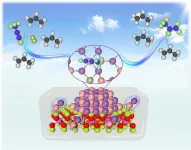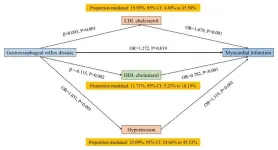(Press-News.org) A different mix of fuels with enhanced properties could overcome some of the major barriers to making fusion a more practical energy source, according to a new study.
The proposed approach would still use deuterium and tritium, which are generally accepted as the most promising pair of fuels for fusion energy production. However, the quantum properties of the fuel would be adjusted for peak efficiency using an existing process known as spin polarization. In addition to spin polarizing half the fuels, the percentage of deuterium would be increased from the usual amount of roughly 60% or more.
Models created by scientists at the U.S. Department of Energy’s Princeton Plasma Physics Laboratory (PPPL) showed the approach allowed tritium to burn more efficiently without sacrificing fusion power. This could dramatically reduce the amount of tritium needed to start up and maintain fusion reactions, leading to more compact and affordable fusion systems.
“Fusion is really, really hard, and nature doesn’t do you many favors,” said Jason Parisi, a staff research physicist at the Lab and first author on the research paper. “So, it was surprising how big the improvement was.”
The paper, which was published in the journal Nuclear Fusion, suggests the approach could burn tritium as much as 10 times more efficiently. The research also underscores PPPL’s role at the forefront of fusion innovation, particularly when it involves a system such as the one studied in Parisi’s research, where gasses are superheated to create a plasma confined by magnetic fields into a shape similar to a cored apple. The Lab’s primary fusion device, the National Spherical Torus Experiment - Upgrade (NSTX-U), has a similar shape to the one the researchers considered when they tested their approach.
“This is the first time researchers have looked at how spin-polarized fuel could improve tritium-burn efficiency,” said staff research physicist and co-author Jacob Schwartz.
Minimizing tritium requirements by maximizing burn efficiency
PPPL principal research physicist and co-author of the paper Ahmed Diallo likens tritium-burn efficiency to the efficiency of a gas stove. “When gas comes out of a stove, you want to burn all the gas,” Diallo said. “In a fusion device, typically, the tritium isn’t fully burned, and it is hard to come by. So, we wanted to improve the tritium-burn efficiency.”
The PPPL team consulted the fusion community and the broader community involved in spin polarization as a part of their work to find ways to enhance tritium-burn efficiency. “Fusion is one of the most multidisciplinary areas of science and engineering. It requires progress on so many fronts, but sometimes there are surprising results when you combine research from different disciplines and put it together,” Parisi said.
A different kind of spin
Quantum spin is very different from the physical spin on a baseball. For example, a good pitcher can throw the ball with one of several different spins. There is a continuum of possibilities. However, there are only a few discrete options for the quantum spin on a particle – for example, up and down.
When two fusion fuel atoms have the same quantum spin, they are more likely to fuse. “By amplifying the fusion cross section, more power can be produced from the same amount of fuel,” said Parisi.
While existing spin-polarization methods don’t align every atom, the gains shown in the PPPL model don’t require 100% spin alignment. In fact, the study demonstrates that modest levels of spin polarization can substantially improve the efficiency of the tritium burn, improving overall efficiency and reducing tritium consumption.
Improving efficiency to reduce tritium requirements
With less tritium required, the overall size of the fusion power plant can be reduced, making it easier to license, situate and construct. Collectively, this should lower the operating costs of the fusion system.
Tritium is also radioactive, and while that radiation is relatively short-lived compared to the spent fuel from nuclear fission reactors, reducing the amount required has safety benefits because it decreases the risk of tritium leakage or contamination.
“The less tritium you have flowing through your system, the less of it will get into the components,” said Parisi. The storage and processing facilities required for the tritium can also be made much smaller and more efficient. This makes things like nuclear licensing easier. “People think that the site boundary size is somewhat proportional to how much tritium you have. So, if you can have a lot less tritium, your plant could be smaller, faster to get approved by regulators and cheaper.”
New avenues to explore
The DOE’s Office of Science has funded separate research about some of the technologies needed to inject the spin-polarized fuel into the fusion vessel. Further work is needed to investigate things needed to implement the proposed system but have yet to be fully explored. “Whether it’s possible to have integrated scenarios that maintain a high-grade fusion plasma with these specific flows of excess fuel and ash from the plasma needs to be determined,” Schwartz said.
Diallo said there are also potential issues related to polarization methods, but these create opportunities. “One challenge would be to demonstrate techniques to produce spin-polarized fuel in large quantities and then store them. There’s a whole new technology area that would open up.”
PPPL is mastering the art of using plasma — the fourth state of matter — to solve some of the world’s toughest science and technology challenges. Nestled on Princeton University’s Forrestal Campus in Plainsboro, New Jersey, our research ignites innovation in a range of applications including fusion energy, nanoscale fabrication, quantum materials and devices, and sustainability science. The University manages the Laboratory for the U.S. Department of Energy’s Office of Science, which is the nation’s single largest supporter of basic research in the physical sciences. Feel the heat at https://energy.gov/science and https://www.pppl.gov.
END
Spinning fusion fuel for efficiency
Aligning the quantum property known as spin for fusion fuels could make it easier to generate electricity economically
2024-11-19
ELSE PRESS RELEASES FROM THIS DATE:
The American Pediatric Society names Dr. Beth Tarini as the recipient of the 2025 Norman J. Siegel New Member Outstanding Science Award
2024-11-19
The American Pediatric Society (APS) is pleased to announce Beth A. Tarini, MD, MS, MBA, as the 2025 Norman J. Siegel New Member Outstanding Science Award recipient for her considerable contributions to pediatric science. The award will be presented to Dr. Tarini during the APS Presidential Plenary at the Pediatric Academic Societies 2025 Meeting in Honolulu, Hawaii, April 24 – April 28.
The award was created in honor of one of the world’s leading nephrologists, Norman J. Siegel, MD, FASN. Dr. Siegel was an outstanding ...
New Clinical Study Confirms the Anti-Obesity Effects of Kimchi
2024-11-19
Approximately 16% of the global population, or about 890 million people, suffer from obesity. The World Health Organization (WHO) has recognized obesity as a significant health issue and highlighted its impact on the quality of life and overall health of individuals across the world. In response to this, the World Institute of Kimchi, South Korea, has been publishing a series of articles on the anti-obesity effects of kimchi in international journals. These articles, based on research studies on the subject, indicate that the regular consumption of kimchi, a traditional ...
Highly selective pathway for propyne semihydrogenation achieved via CoSb intermetallic catalyst
2024-11-19
Researchers delved deep into the regulation of cobalt active sites to enhance the selectivity of propylene to improve scalability and affordability of the production of this important chemical.
Chemical reactions are not always naturally optimized to yield the products in the quantities needed, especially on the scale needed for the amount of industry in the world today. Researchers from East China University of Science and Technology explored the options available to develop a more cost-effective, scalable and straightforward ...
GERD linked to cardiovascular risk factors: New insights from Mendelian randomization study
2024-11-19
A recent study published in the Journal of Translational Internal Medicine (https://doi.org/10.1515/jtim-2024-0017) reveals significant insights into the broader impact of gastroesophageal reflux disease (GERD) on cardiovascular health. By using a rigorous bidirectional Mendelian randomization (MR) approach, the research provides compelling evidence that GERD—a condition traditionally recognized as a digestive disorder characterized by acid reflux and heartburn—may influence key cardiovascular risk factors, including blood pressure, lipid ...
Content moderators are influenced by online misinformation
2024-11-19
Repeated exposure to lies online may influence the beliefs of professional content moderators, with consequences for online platforms. Hundreds of thousands of content moderators, typically based in non-Western countries, identify and weed out problematic and false content on social platforms. However, constant exposure to misinformation could convince some content moderators that false claims are true, in what is known as the “illusory truth effect.” Hause Lin and colleagues assessed the extent of this effect among professional content moderators in India and the Philippines and explored whether encouraging an accuracy mindset reduces the effect. ...
Adulting, nerdiness and the importance of single-panel comics
2024-11-19
COLUMBUS, Ohio – While comics have become a culturally popular and widely studied art form in recent decades, one format remains overlooked: the single-panel comic.
Comics like “The Family Circus,” “Ziggy” and “Little Lulu” are often seen as simplistic and not worthy of critical attention, argues Michelle Ann Abate, author of the new book Singular Sensations: A Cultural History of One-Panel Comics in the United States.
“There tends to be a belief there ...
Study helps explain how children learned for 99% of human history
2024-11-19
PULLMAN, Wash. — Unlike kids in the United States, hunter-gatherer children in the Congo Basin have often learned how to hunt, identify edible plants and care for babies by the tender age of six or seven.
This rapid learning is facilitated by a unique social environment where cultural knowledge is passed down not just from parents but from the broader community, according to a new Washington State University-led study in the Proceedings of the National Academy of Sciences.
The research helps explain how many cultural traits have been preserved for thousands of years among ...
The impact of misinformation on Spanish-language social media platforms
2024-11-19
US Latinos who rely on social media in Spanish for their news are more vulnerable to political misinformation than those who use English-language social media, according to a study. Misinformation swirls on social media in every language, but social media companies struggle to combat disinformation circulating in Spanish on major social media platforms. In a study done in partnership with Jonathan Nagler of NYU’s Center for Social Media and Politics as part of the group’s Bilingual Election Monitor project, Marisa Abrajano and colleagues surveyed over 1,000 English-dominant, bilingual, and Spanish-dominant Latino users of ...
Populations overheat as major cities fail canopy goals: new research
2024-11-19
A new study led by RMIT University in Australia measuring access to nature for eight major global cities found most still have inadequate canopy cover, despite access to an abundance of trees.
Less than 30% of buildings in New York City, Amsterdam, Buenos Aires, Denver, central Sydney and central Melbourne were in neighbourhoods with adequate canopy cover.
New York and Amsterdam both scored almost 0% for canopy cover despite 92% and 50% of buildings having views of at least three trees, respectively.
The research, a collaboration with the Technical University of Munich, studied over 2.5 million buildings across ...
By exerting “crowd control” over mouse cells, scientists make progress towards engineering tissues
2024-11-19
Genes aren’t the sole driver instructing cells to build multicellular structures, tissues, and organs. In a new paper published in Nature Communications, USC Stem Cell scientist Leonardo Morsut and Caltech computational biologist Matt Thomson characterize the influence of another important developmental driver: cell density, or how loosely or tightly cells are packed into a given space. In both computational models and laboratory experiments, the team of scientists used cell density as an effective tool for controlling how mouse cells pattern themselves into complex structures.
“This paper represents progress towards our big picture goal of engineering synthetic ...
LAST 30 PRESS RELEASES:
Low-intensity treadmill exercise preconditioning mitigates post-stroke injury in mouse models
How moss helped solve a grave-robbing mystery
How much sleep do teens get? Six-seven hours.
Patients regain weight rapidly after stopping weight loss drugs – but still keep off a quarter of weight lost
GLP-1 diabetes drugs linked to reduced risk of addiction and substance-related death
Councils face industry legal threats for campaigns warning against wood burning stoves
GLP-1 medications get at the heart of addiction: study
Global trauma study highlights shared learning as interest in whole blood resurges
Almost a third of Gen Z men agree a wife should obey her husband
Trapping light on thermal photodetectors shatters speed records
New review highlights the future of tubular solid oxide fuel cells for clean energy systems
Pig farm ammonia pollution may indirectly accelerate climate warming, new study finds
Modified biochar helps compost retain nitrogen and build richer soil organic matter
First gene regulation clinical trials for epilepsy show promising results
Life-changing drug identified for children with rare epilepsy
Husker researchers collaborate to explore fear of spiders
Mayo Clinic researchers discover hidden brain map that may improve epilepsy care
NYCST announces Round 2 Awards for space technology projects
How the Dobbs decision and abortion restrictions changed where medical students apply to residency programs
Microwave frying can help lower oil content for healthier French fries
In MS, wearable sensors may help identify people at risk of worsening disability
Study: Football associated with nearly one in five brain injuries in youth sports
Machine-learning immune-system analysis study may hold clues to personalized medicine
A promising potential therapeutic strategy for Rett syndrome
How time changes impact public sentiment in the U.S.
Analysis of charred food in pot reveals that prehistoric Europeans had surprisingly complex cuisines
As a whole, LGB+ workers in the NHS do not experience pay gaps compared to their heterosexual colleagues
How cocaine rewires the brain to drive relapse
Mosquito monitoring through sound - implications for AI species recognition
UCLA researchers engineer CAR-T cells to target hard-to-treat solid tumors
[Press-News.org] Spinning fusion fuel for efficiencyAligning the quantum property known as spin for fusion fuels could make it easier to generate electricity economically









